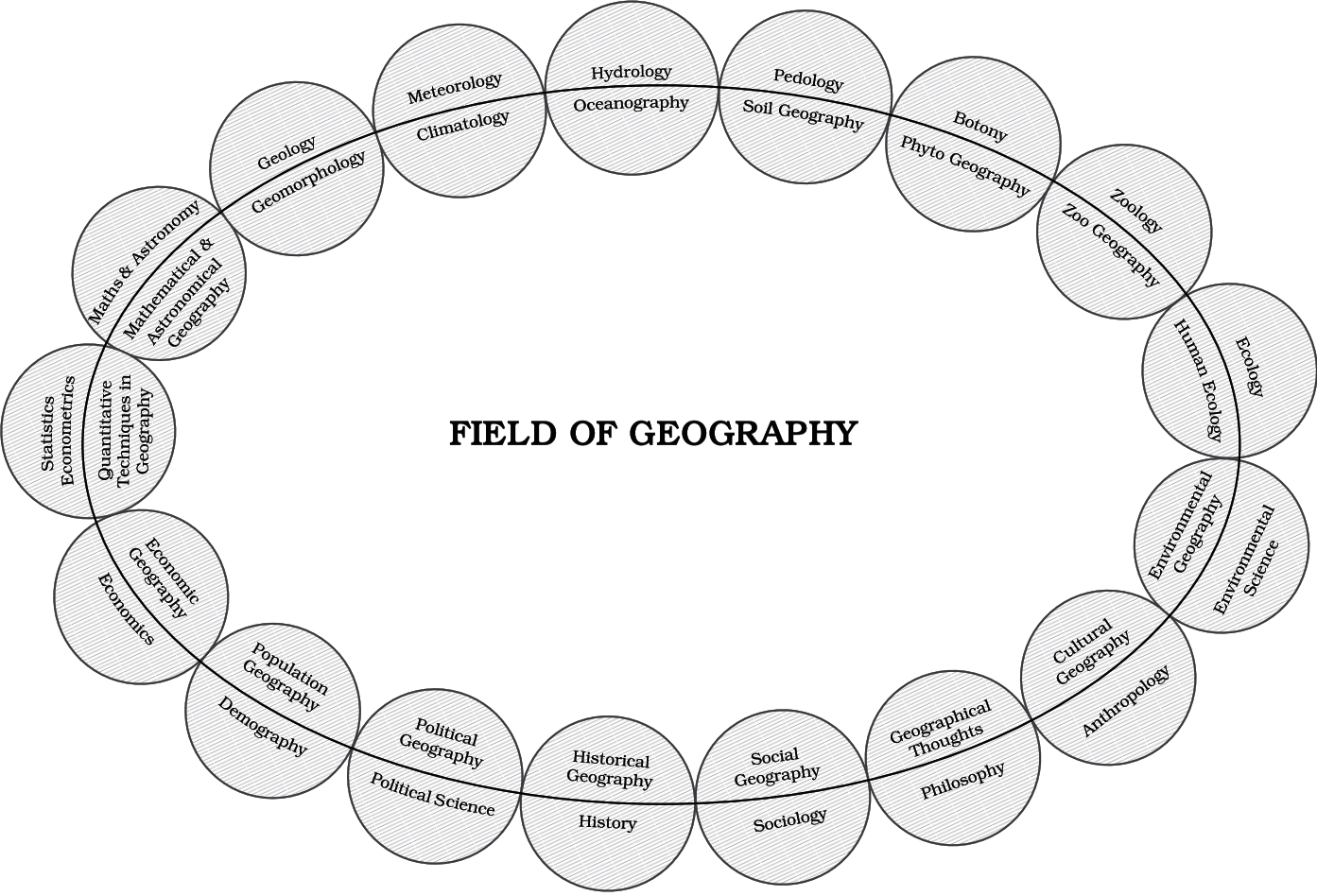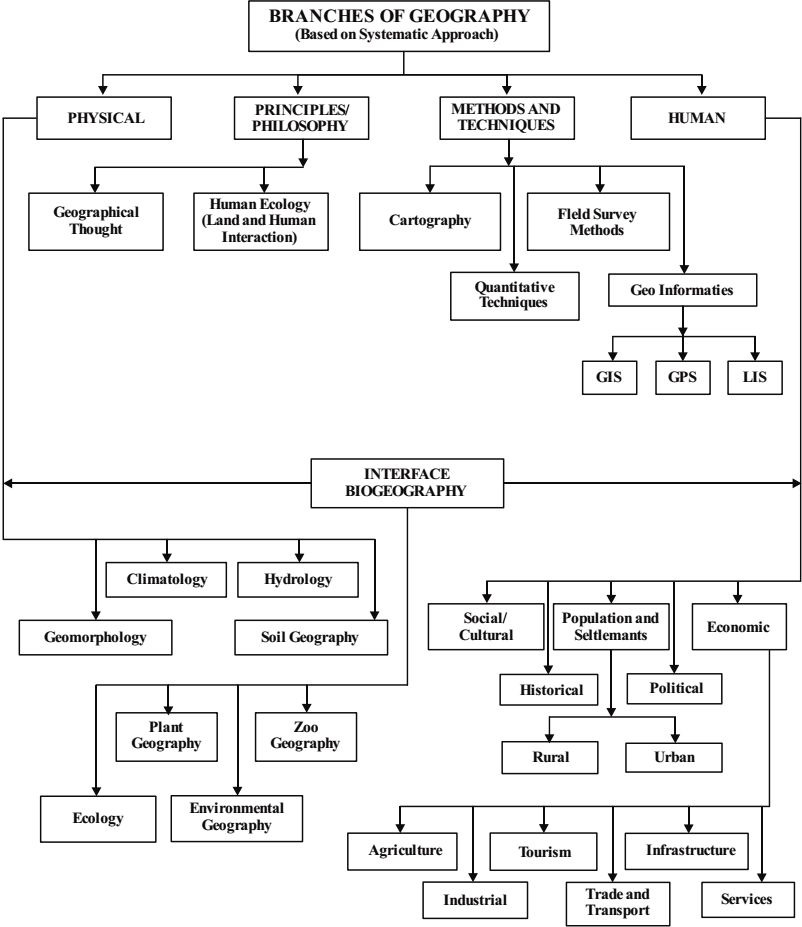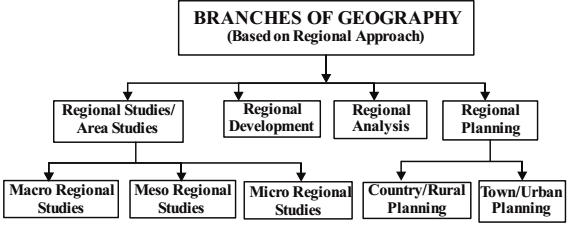Geography : Fundamental of Physical Geography
Revision Notes Geography Class 11 Chapter 1 Geography as a Discipline
Summary
This unit deals with
- Geography as an integrating discipline; as a science of spatial attribute
- Branches of geography: importance of physical geography
- What is geography?
- Relation between man and nature?
- Development of geography
- Relation between geography and other subjects
- Geography answers the questions where? What? & Why?
- Relation between Physical Geography and Natural Science’
- Geography and social science relation.
- Branches of Geography Based on Systematic Approach and Regional Approach.
- Physical geography and its importance.
Why Should we study Geography?
- We live on the earth’s surface
- Our lives are affected many ways by surroundings
- We depend on the resources available from the earth surface
- Primitive societies substituted on the plants and animals
- Food, shelter, and dress are depending on the climate
- Cropping pattern is based on climate of the place
- To know the changes taken place throughout the geological time
- To know the lands and people
- Develop skills to convert globe to map
- To have visual sense of the earth surface
The earth consists of physical and cultural features. They are different from one place to another. This difference helped to understand the relation between physical and cultural features. Physical features provided the stage and human societies enacted the drama to develop their skills. With the use of skills and tools, he modified the nature.
Geography is the Description of the Earth
What are the recent techniques that helped the geographer to understand the earth’s surface better?
- GIS & GPS
- Computer Cartography
Who was the first to coin the term ‘Geography’?
Eratosthenes, A Greek Scholar (276-194 BC) in the third century. His famous book was called ‘Geographia.’
Who coined the term “Geography” first?
Eratosthenes, A Greek Scholar (276-194 BC)
What is the origin of the word, “Geography”?
The word derived from Greek language geo= earth, graphos-description. Some scholars defined geography as the description of the earth as the abode of human
How can we say that the earth is “multidimensional”?
Many Sciences developed to describe the physical features of the earth such as Geology, Pedology, Oceanography Botany, Zoology and Meteorology & Cultural features of the earth such as Economics, History, Sociology, Political Science, Anthropology.
How does Geography differ from other subjects?
Geography differs from other subjects in terms of matter and methodology. Geography derives its data from Social Sciences and Natural Sciences.
What do you mean by “areal differentiation”?
When there is similarity and dissimilarity among the physical and cultural features on the earth surface, it is called aerial differentiation.
What do Geographers study?
They study the variations and association of the features on the earth surface e.g. Cropping pattern differs from place to place and it is due to difference in the climate, soil, demand, transport facility, capacity of the farmer. A geographer also studies the cause and effect relationships. The interaction between man and nature is highly dynamic and not static; so it is also called as the study of the relation between unstable earth and untrusting man.
What is the relation between man and nature?
Human is an integral part of nature and nature has imprints of man.
What is the effect of nature on man?
Food clothing, shelter and occupation of man are decided by the nature.
How does technology help man?
- to loosen the shackles of the physical conditions.
- to develop resources and utilise them.
- to reach the higher needs of the life. It increased the production of the crops & mobility of labor.
Describe the dialogue between nature and man.
You created the soil, I created the cup,
You created night, I created the lamp.
You created wilderness, hilly terrains and deserts;
I created flower beds gardens.
Explain the changes occurred in the civilization of man.
- Man moved from stage of necessity to stage of freedom.
- Created new possibilities from the nature
- We find now humanized nature and naturalised man
- Space got organized with the help of transport and communication.
What does Geography study?
Geography is the study of Earth’s landscapes, peoples, places and environments. It is, quite simply, about the world in which we live. Geography is unique in bridging the social sciences (human geography) with the natural sciences (physical geography). It also studies spatial organization and spatial integration.
Which are the three questions concerned with Geography?
- Some questions are related to the identification of the patterns of natural and cultural features as found over the surface of the earth. These are the questions about what?
- Some questions are related to the distribution of the natural and human cultural features over the surface of the earth. These are the questions about where?
- The third question is related to the explanation or the causal relationships between features and the processes and phenomena. This aspect of geography is related to the question, why?
How can we say that Geography is an integrated discipline?
It is a discipline of synthesis; it includes spatial and temporal synthesis.
Its approach is holistic in nature. it recognizes the fact that the world is a system of interdependence. The present world is a global village. The efficient transport and communication helped the world to become unified village. The audiovisual media helped the data to be enriched. Technology provided better chances of monitoring natural phenomena as well as the economic and social parameters. Geography as an integrating discipline has interface with numerous natural and social sciences.
What is the basic objective of Sciences & Social Sciences?
The basic aim of Science and Social Science is to understand the reality of the nature.
Explain the relationship of Geography with other subjects?
Relation with other Subjects
How do other subjects help Geography as an integrated subject?
History helps in knowing the man-made activities; Physics helps to calculate the effect of climate on man. Economics helps to understand the effect of human activities on the development of the country. The geographical factors modified the course of history. The change in the climate has influence on the occupation.
Physical Geography and Natural Science
Define the relation of geography with Natural Science.
- All branches of physical Geography have close relation with Natural Sciences. Biogeography has close link with Zoology and Botany.
- Mathematics and Arts also have contributed to the development of Geography to measure the area and dimensions of the earth. Cartography and projections are based on mathematics.
Explain the contribution of social science to the Human geography.
History of geographical thought is the mother of all branches of geography. Sociology, political science, economics provide the aspects of social reality. Population geography has close link with demography.
Branches of Geography
Based on systematic approach Introduced by Alexander Von Humbol German geographer (1769-1859)
What is the importance of Physical Geography?
- Physical geography includes study of Lithosphere, Atmosphere, Hydrosphere & Biosphere- each element is very important for human beings.
- Landforms provide base for agriculture, industries, transport and communication, and settlements. Mountains provide water to rivers, forests-center for tourist spots.
- Climate influences on the cropping pattern, livestock food and clothes of the people.
- Climate and precipitation influence the type of forests. Oceans provide food, water transport, and influence the climate; they are the source of hydrological cycle.
- Geomorphology is devoted to the study of land forms, their evolution and related processes.
- Climatology encompasses the study of structure of atmosphere and elements of weather and climates and climatic types and regions.
- Hydrology studies the realm of water over the surface of the earth including oceans, lakes, rivers and other water bodies and its effect on different life forms including human life and their activities.
- Soil Geography is devoted to study the processes of soil formation, soil types, their fertility status, distribution and use.






